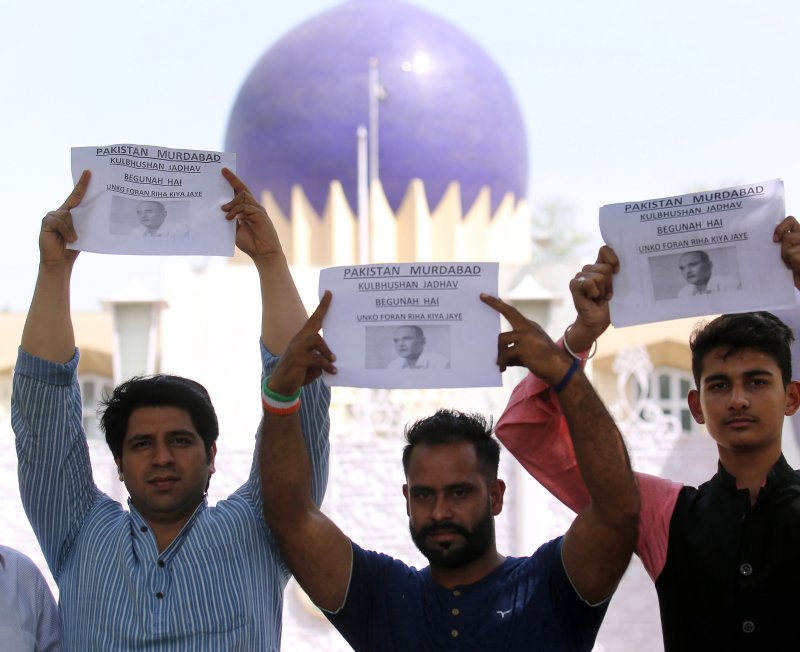Indian activists hold placards as they protest in support of an Kulbushan Sudhir Jadhav outside Pakistan High Commission in New Delhi, India, on April 11. The placard reads "Pakistan down down. Kulbushan Jadhav is innocent and release him immediately." The International Court of Justice has ordered Pakistan not to execute Jadhav, convicted of spying, while his case is being considered. EPA photo by Rajat Gupta.
May 10 (UPI) -- Paskistan was ordered to halt plans to execute an Indian man convicted of spying while the International Court of Justice considers the case.
Kulbushan Sudhir Jadhav was arrested on March 3, 2016, in Balochistan, Pakistan. He was sentenced to death last month in military court "for his involvement in espionage and sabotage activities against Pakistan."
On Tuesday, ICJ President Justice Ronny Abraham directed Pakistan Prime Minister Nawaz Sharif to "act in such a way so as to enable the court to enforce any decision it takes on the Indian plea."
The ICJ, the principle judicial arm of the United Nations, settles disputes between member states in accordance with international law. According to an ICJ release, "judgments have binding force and are without appeal for the parties concerned."
India asked the ICJ at the Hague not to execute Jadhav until the court can issue a judgment based on its claims. India accused Pakistan of "egregious violations of the Vienna Convention," according to the ICJ release.
Pakistan Defense Minister Khawaja Asif posted on Twitter that India's letter to the ICJ was an "attempt to divert attention from state sponsored terrorism" in Pakistan.
Indian External Affairs Minister Sushma Swaraj described the "farcical nature" of the trial.
"The government and people of India would view very seriously the possibility that an innocent Indian citizen is facing death sentence in Pakistan without due process and in violation of basic norms, law, justice and international relations," she said in a statement on April 11.
India alleges Jadhav was "kidnapped" on business in Iran after retiring from the Indian navy.
Indian authorities say they learned of his March arrest through a press release nearly three weeks later and were refused consular access 13 times, in violation of the Vienna Convention.
The Pakistani military said in a statement Jadhav confessed to planning, coordinating and organizing espionage in "aiming to destabilize and wage war against Pakistan."
Amnesty India posted on Twitter it has "found that military courts are linked to coerced confessions, opaque processes & unfair trials."
Pakistan carried out 87 executions in 2016, according to Amnesty International.
And more than 40 alleged Pakistani spies have been arrested in India since 2013, according to the government.
Indian and Pakistan accuse each other of aiding separatists.
Pakistan accuses India of helping the movement in Balochistan, a charge denied by India.
India says Pakistan aids fighters in Kashmir, part of India's only Muslim-majority state, which Pakistan also claims.















